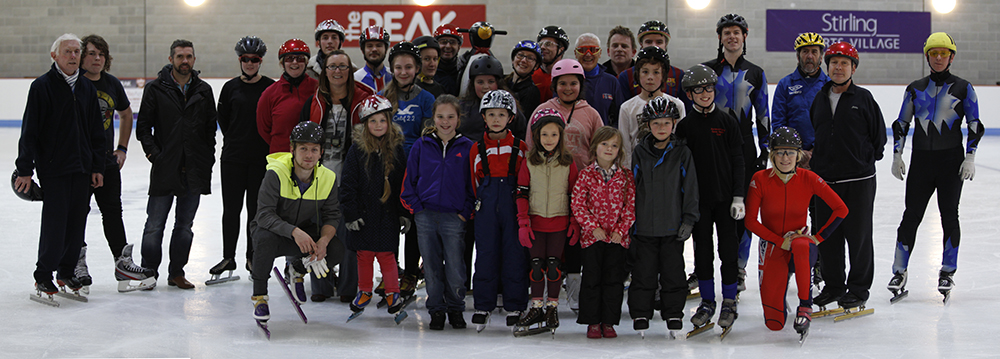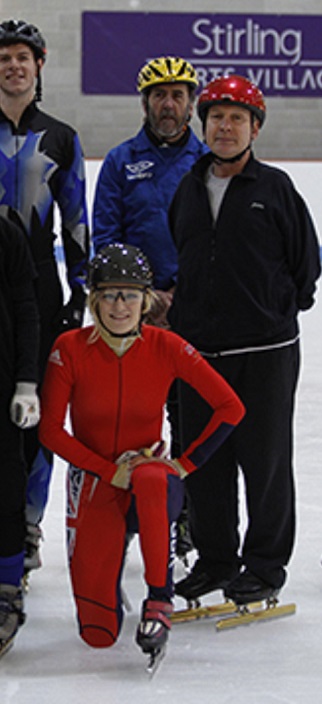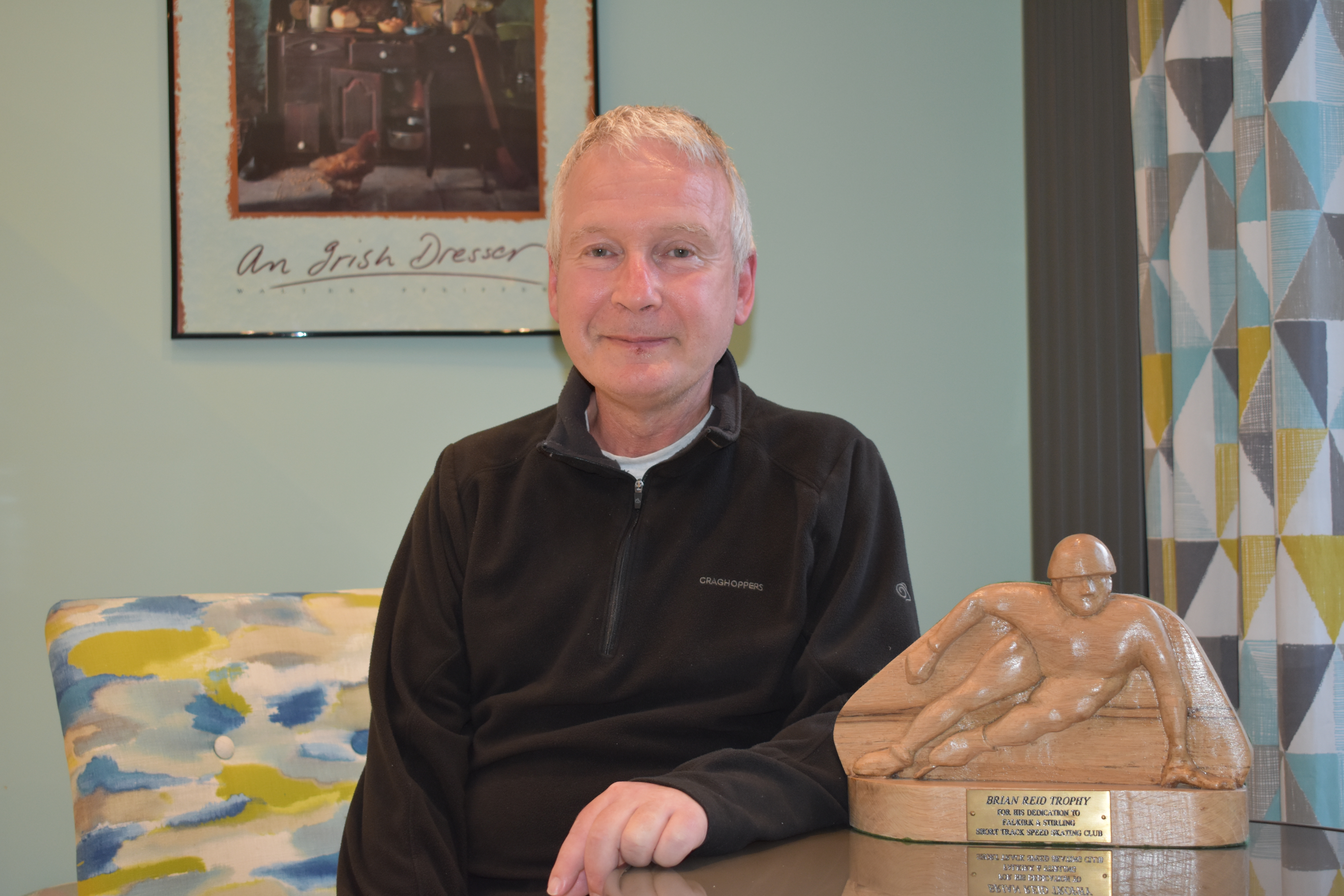What is MND
Find support
I have MND
I am supporting someone
Get involved
Research
About MND Scotland

MND is a terminal illness, which stops signals from the brain reaching the muscles. This may cause someone to lose the ability to walk, talk, eat, drink or breathe unaided.
Despite the average life expectancy from diagnosis being just 20 months, the former British Masters speed skating champion has been living with a rare, slow-progressing form of the terminal illness, which has now forced him to hang up his skates for good.
Brian said:
“I’ve gotten to the stage where I can’t really skate now. Up until a few weeks ago, I could go on the ice and potter around, but because my arms don’t work, my balance is off.”
“I’ve never stopped for anything, but now I basically need help to do every single thing. It’s a very, very frustrating life. One of the biggest things was losing my independence, I would always go on skating trips, and now I find it very hard to get away.”
Brian has been married to wife Margaret (62) for 40 years and the couple are parents to Nicola (33), Alison (31), and grandparents to Isla (18 months).
In his time as an ice speed skater himself, Brian has competed all over the world, being selected for the British team for the World Championships, and twice missing out on selection as a part of Team GB’s Olympic squad.
Brian later became the Head Coach of Forth Valley Ice Speed Club, where he was asked if he could take a 12-year-old Elise Christie under his wing.
Brian said:
“When Elise first came to me she was a figure skater. She lived in Livingston and was travelling through to Irvine. She saw the speed skating there and so she tried it out. Her coach, who was a good friend of mine, recommended that she come to me in Stirling, so that I could help her develop.
“So she came along and I saw a lot of talent there. Her mother asked if I could help her out and Elise was very enthusiastic. We did two club sessions and I did two one-on-one sessions with her every week.

“She just loved skating. She loved the speed aspect of it and the competitiveness.
“Skating with us, we had gotten her up from a novice, to British Junior Champion, so when she got to that stage, she got the invite from the GB squad. She left for Nottingham on her 16th birthday, but still a club member, and we’ve kept in touch ever since.”
It was after Elise’s move to Nottingham for advanced training, that Brian began to notice the first symptoms of his MND.
Brian said:
“I felt the first symptoms about 12 years ago. We were out for a family night out and at dinner I had a knife in my hand and my hand just locked around it, I couldn’t move it, I couldn’t get the knife out.
“I thought it was strange, so I saw my GP a few times and they said they couldn’t see anything wrong. Just as I was leaving I put my hand down on the desk and it went into a spasm. She started looking through my notes, that I had been before, so she sent me to see a neurologist.
“I asked my neurologists what they thought the prognosis could be, in a worst case scenario. The neurologist told me, very matter-of-factly, that I could lose the use of my arms and legs.
“It didn’t actually sink-in until I got outside. I thought, oh no, this could be serious.”
It was four years later, in 2010, when Brian was finally told that he had Motor Neurone Disease.
“It’s delayed shock when you get told something life changing like that.
“At the time both of my daughters were living in Australia, the youngest one decided to come back. You hear about cases where, within three months, people progress very quickly and are in wheelchairs. At the time, I didn’t know I would progress so slowly.
“I initially started going to MND Scotland support group meetings, but I felt embarrassed. I felt like I was a fraud, especially when I saw the condition of other people there.
“I got speaking to one man in a wheelchair and I asked how long it was since he was diagnosed. He told me it had been three months. He asked me how long it had been for me and I didn’t want to say it out loud. It’s the same disease, but I had been diagnosed for 7 years at that point and I was still walking around, using my arms.

Despite his frustration at his condition, Brian is thankful for all the support he has received from the charity MND Scotland, which have helped with physiotherapy, complementary therapy, support group meetings and equipment loan services.
“I just want to thank my MND nurses and add what a brilliant job MND Scotland are doing. I don’t know where we’d be without them.”
Although he can no longer make it onto the ice himself, Brian has been closely following Elise’s efforts at the 2018 Winter Olympics, and was left devastated for Elise when she was disqualified from her final event, the 1,000m, on Tuesday (20th February).
“I’m immensely proud of Elise, first of all for starting the 1,000m with an injury and then battling through, just to be robbed. I found the official’s decision totally baffling. It is totally inexplicable.
“I am very keen to hear the justification, as yellow cards, unlike football, are very rare in ice speed skating.”
If you’d like to share your personal story, to help us raise awareness of MND, please get in touch with Niamh and Craig in our Communications team at communications@mndscotland.org.uk or give us a call on 0141 332 3903.
Sign up
for newsletter
Get the latest news and events straight to your inbox.
You can help create a world without MND